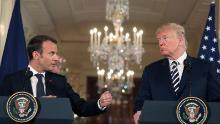WaPo: Trump's personal calls to world leaders leave White House aides in the dark
(CNN)President Donald Trump started handing out his personal cell phone number to world leaders shortly after he took office last year, leading to one-on-one calls that even top White House aides did not know about, according to a report in The Washington Post.
White House aides learned of an April 2017 call between Canadian Prime Minister Justin Trudeau and Trump only after a standard summary was issued by officials in Canada, according to the Post, which said its report was based in interviews with US and European officials who spoke on condition of anonymity.
Conversations with world leaders are required by federal records law to be routed through the Situation Room, the Post reports. Such calls are typically heavily prepared for and monitored by the White House; the national security adviser briefs the president, and regional experts provide prepared talking points. The national security adviser then remains by the president's side throughout the call, and a transcript of the call is distributed to key White House aides, who issue a public readout.
When it came to the call with Trudeau, US officials had to rely on Trump's recollection. The short official statement released simply said it was "a very amicable call."
The White House did not immediately respond to CNN's request for comment.
Trump's lack of preparation leads to unpredictable interactions with world leaders, the Post reported, citing officials. Trump rarely reads the nightly briefing book prepared for him on relevant issues likely to come up in meetings. Aides try to make it easier for him to read by putting the most critical information in a red folder for him.
Trump's freewheeling approach -- including his reliance on instincts and willingness to challenge longstanding assumptions -- has alarmed allies and some of Trump's closest aides over concessions he may offer to Russian President Vladimir Putin during their one-on-one meeting later this month, the Post reports. It has also led to mixed messages from his administration in the days leading up to next week's NATO summit.
"These are not real estate deals," retired Gen. Wesley Clark, a former NATO commander, said on CNN Saturday on the topic of the upcoming summit. "This is not a matter of 'Hey, I've got a good relationship with so and so I'm sure he'll sell me the piece of property I need.'"
"Countries and systems have long-term interests," and Putin's is "restore Russia's border security by if not occupying then dominating its neighbors," Clark said.
News Courtesy: www.cnn.com











